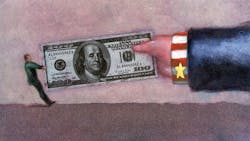Finance: For Manufacturers, 2013 Will Be a Taxing Situation
It's difficult to find near unanimity on any business topic, but when asked if the U.S. corporate tax system is flawed and in need of reform, 95% of those polled by audit, tax and advisory firm KPMG said, "yes." What's more, a subsequent KPMG poll indicates that most of the respondents (largely CFOs, controllers and tax directors) don't feel that the "Fiscal Cliff" tax agreement will lead to meaningful tax reform in 2013.
See Also: Manufacturing Industry Finance News & Trends
"The business community is telling us that a stronger economic recovery is clearly linked to having a better picture of how companies and individuals will be taxed," says Hank Gutman, principal and director of KPMG's Tax Governance Institute and former chief of staff of the U.S. Congressional Joint Committee on Taxation. "They also acknowledge that prospects for a quick resolution of tax reform -- and the business tax issue in particular -- are far from clear over the short term."
U.S. companies have long complained of what they view as an unnecessarily high corporate tax rate. Indeed, according to KPMG research, the U.S. corporate tax rate of 40% (federal plus state) is roughly 37% higher than the 25% average for the other member countries in the OECD (Organization for Economic Cooperation and Development). In fact, the U.S. corporate tax rate was seen as the dominant business tax concern among respondents to a KPMG survey.
When asked when they expected to see comprehensive business tax reform enacted, 42% said it would be 2015 or beyond, while 20% are hopeful of seeing it in 2014. And almost half (44%) of the respondents believe the debate over the debt ceiling and sequestration will be the most significant issue affecting the U.S. economy in the first half of 2013.
While the American Taxpayer Relief Act of 2012 (the so-called "Fiscal Cliff" agreement) contains "a potpourri of rate changes, extensions of expiring (or expired) provisions, special rules, credits and other modifications that will affect every taxpayer to a greater or lesser extent, it does not represent even a tiny step towards the significant tax reform that most observers long for," observes Robert M. Gordon, managing director with True Partners Consulting and formerly assistant general tax counsel and head of tax with BP America's manufacturing and retail division.
What’s New in the Tax Act?
That being said, Gordon lists some of the most significant changes in business tax provisions due to the Act:
- Extending 50% bonus depreciation for qualifying property placed in service before January 1, 2014 (or January 1, 2015, for certain long-lived and transportation assets).
- Increasing the limitation for expensing under section 179 to $500,000, with a $2 million phase-out amount.
- Allowing look-through for certain payments between related controlled foreign corporations (CFCs) under the foreign personal holding company rules, thereby permitting deferral for the deployment of capital from one CFC to another without triggering U.S. tax. Expires at the end of 2013.
- Extending the temporary exclusion of 100% of gain on qualifying small business stock to stock acquired before January 1, 2014, and held for more than five years.
- Extending numerous expiring provisions through December 31, 2013, including: new markets tax credit; work opportunity tax credit; employer wage credit for employees on active duty in the uniformed services.
About the Author
Dave Blanchard
Senior Director of Content
Focus: Supply Chain
Call: (941) 208-4370
Follow on Twitter @SupplyChainDave
During his career Dave Blanchard has led the editorial management of many of Endeavor Business Media's best-known brands, including IndustryWeek, EHS Today, Material Handling & Logistics, Logistics Today, Supply Chain Technology News, and Business Finance. He also serves as senior content director of the annual Safety Leadership Conference. With over 30 years of B2B media experience, Dave literally wrote the book on supply chain management, Supply Chain Management Best Practices (John Wiley & Sons, 2010), which has been translated into several languages and is currently in its second edition. He is a frequent speaker and moderator at major trade shows and conferences, and has won numerous awards for writing and editing. He is a voting member of the jury of the Logistics Hall of Fame, and is a graduate of Northern Illinois University.

